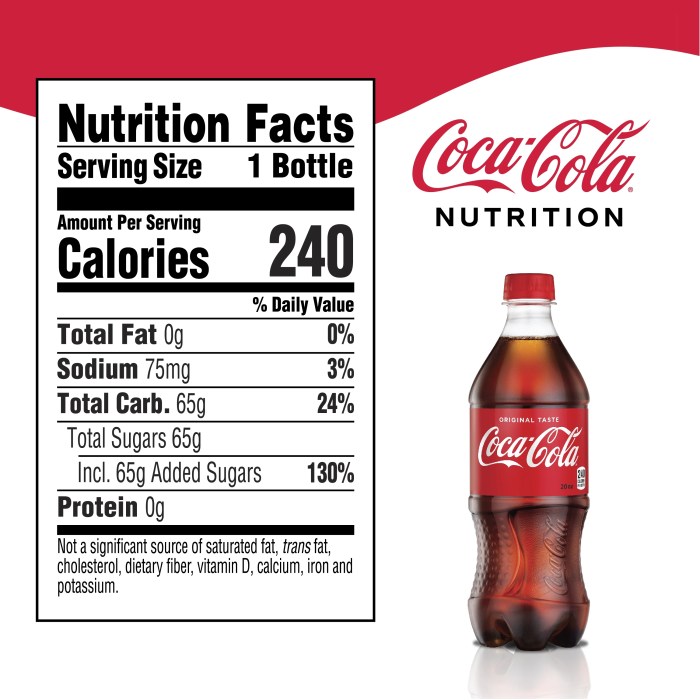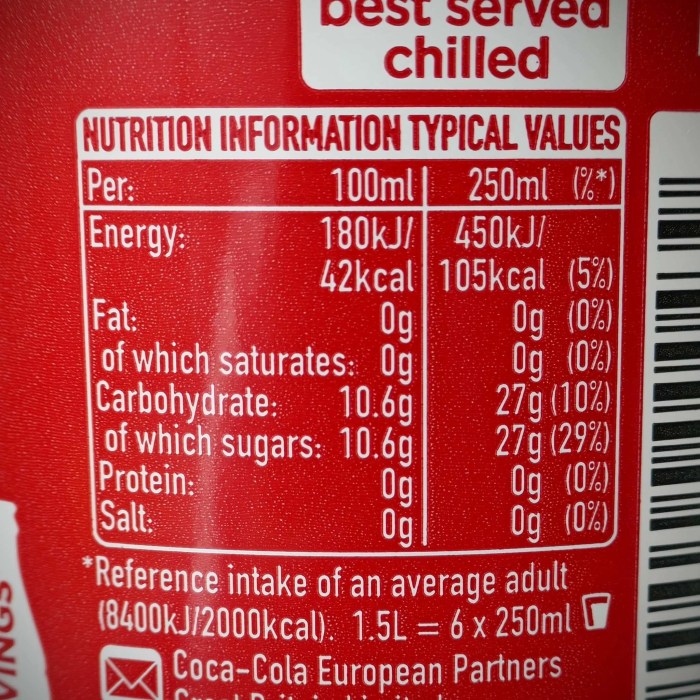Coca-Cola’s Nutritional Content Overview

Nutrition facts label of coca cola – Let’s delve into the heart of the matter, friends, and dissect the nutritional landscape of this iconic beverage. Understanding what’s in your Coca-Cola is key to making informed choices about your consumption. This isn’t about judgment, but about empowerment – knowing allows you to savor responsibly.
The nutritional information on a Coca-Cola label provides a snapshot of the contents per serving. This data is crucial for managing your daily intake of calories, sugars, and other components. Remember, moderation is the spice of life, even when it comes to the sweet elixir of Coca-Cola.
Nutritional Components of Coca-Cola
The typical Coca-Cola nutrition facts label will detail several key components. These components vary slightly depending on the specific Coca-Cola product (Regular, Diet, Zero Sugar, etc.), but the core elements remain consistent. Let’s examine them with the clarity and precision a seasoned craftsman would employ.
Unlocking the secrets of the Coca-Cola nutrition facts label is a fascinating journey! Want to compare and contrast? Check out the detailed breakdown of can coke zero nutrition facts to see how it stacks up against its sugary counterpart. Understanding these labels empowers you to make informed choices about your beverage intake and overall health! So dive in and discover the nutritional differences!
| Nutritional Component | Regular Coca-Cola (per serving) | Diet Coca-Cola (per serving) | Coca-Cola Zero Sugar (per serving) |
|---|---|---|---|
| Serving Size (approx.) | 355ml (12 fl oz) | 355ml (12 fl oz) | 355ml (12 fl oz) |
| Calories | 140 | 0 | 0 |
| Total Fat | 0g | 0g | 0g |
| Saturated Fat | 0g | 0g | 0g |
| Trans Fat | 0g | 0g | 0g |
| Cholesterol | 0mg | 0mg | 0mg |
| Sodium | 0mg | < 5mg | < 5mg |
| Total Carbohydrate | 39g | 0g | 0g |
| Dietary Fiber | 0g | 0g | 0g |
| Total Sugars | 39g | 0g | 0g |
| Added Sugars | 39g | 0g | 0g |
| Protein | 0g | 0g | 0g |
Note: These values are approximate and may vary slightly depending on the manufacturing process and the specific batch. Always refer to the nutrition label on the individual product for the most accurate information.
Nutritional Differences Between Coca-Cola Products
The table above highlights the significant differences in nutritional content between regular Coca-Cola, Diet Coca-Cola, and Coca-Cola Zero Sugar. Regular Coca-Cola contains a substantial amount of sugar, contributing to its caloric content. Diet and Zero Sugar versions utilize artificial sweeteners to eliminate or significantly reduce sugar and calories, providing a different flavor profile and nutritional impact. The choice ultimately rests on individual preferences and dietary goals.
Sugar Content and its Implications

The sweetness of Coca-Cola, a defining characteristic enjoyed by millions, stems largely from its significant sugar content. This seemingly simple fact carries profound implications for health, impacting everything from weight management to the well-being of our hearts and teeth. Understanding the role of sugar in Coca-Cola is crucial for making informed choices about our consumption.The high sugar concentration in Coca-Cola is a primary concern.
A typical serving contains a substantial amount of added sugar, often in the form of high-fructose corn syrup. This surpasses the recommended daily intake of added sugars for many individuals, leading to potential health risks if consumed regularly in significant quantities.
Coca-Cola’s Sugar Content Compared to Other Beverages, Nutrition facts label of coca cola
Comparing Coca-Cola’s sugar content to other popular drinks reveals its relative position. While other carbonated soft drinks also contain considerable amounts of sugar, Coca-Cola often falls within a similar range. Fruit juices, though perceived as healthier, can also be surprisingly high in natural sugars. The key difference lies in the type of sugar and the presence of other nutrients.
Fruit juices, for example, typically contain vitamins and minerals absent in Coca-Cola. However, the overall sugar load can be comparable, highlighting the need for moderation across all sugary beverages. A direct comparison requires looking at the nutrition labels of specific brands and serving sizes. For instance, a 12-ounce can of Coca-Cola might contain approximately 39 grams of sugar, while a similar serving of some fruit juices could contain a comparable or even higher amount.
Effects of High Sugar Consumption on Health
Excessive sugar consumption, frequently associated with regular Coca-Cola intake, presents multiple health challenges.
Weight Management
High sugar intake contributes significantly to weight gain. Sugar provides empty calories, lacking essential nutrients while being readily converted to fat if not used for immediate energy. This excess energy storage leads to weight gain, increasing the risk of obesity and related health problems like type 2 diabetes. Consider the example of someone consuming multiple Coca-Cola servings daily; the accumulated sugar intake far exceeds their energy needs, resulting in a consistent caloric surplus and subsequent weight gain.
Dental Health
Sugar feeds the bacteria in our mouths, producing acids that erode tooth enamel, leading to cavities and tooth decay. The sticky nature of some sugary drinks also contributes to plaque buildup, exacerbating the problem. The frequent consumption of Coca-Cola, with its high sugar content, increases the risk of dental problems significantly. Regular brushing and flossing are important preventative measures, but reducing sugary drink intake is equally crucial.
Cardiovascular Health
High sugar intake is linked to increased risks of cardiovascular diseases. Excessive sugar consumption can contribute to high blood pressure, high cholesterol, and inflammation, all risk factors for heart disease and stroke. Long-term consumption of sugary beverages like Coca-Cola, therefore, contributes to a higher risk profile for cardiovascular issues. Studies have shown a correlation between high sugar intake and an increased incidence of heart-related complications.
Popular Questions: Nutrition Facts Label Of Coca Cola
Is Coca-Cola addictive?
While not technically addictive in the same way as a hard drug, Coca-Cola’s high sugar and caffeine content can create a dependence for some people, leading to cravings and withdrawal symptoms.
Does diet Coca-Cola have any calories?
Diet Coca-Cola typically has very few, if any, calories, as it uses artificial sweeteners instead of sugar. However, individual products may vary slightly.
What are the long-term effects of consuming too much Coca-Cola?
Excessive consumption is linked to weight gain, dental problems, increased risk of type 2 diabetes, and cardiovascular issues. It’s all about balance, my friend!
Are there healthier alternatives to Coca-Cola?
Absolutely! Water, unsweetened tea, and fruit-infused water are excellent choices. Even sparkling water can satisfy that bubbly craving without the sugar overload.
